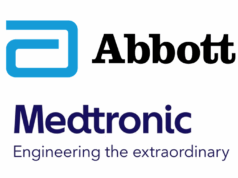 Medtronic has announced results from late breaking clinical trials, presented online at HRS 2020 Science, evaluating the MyCareLink Heart mobile app and the Micra Transcatheter Pacing System (TPS).
Medtronic has announced results from late breaking clinical trials, presented online at HRS 2020 Science, evaluating the MyCareLink Heart mobile app and the Micra Transcatheter Pacing System (TPS).
Results from the BlueSync Evaluation study demonstrated that patients who used the Medtronic MyCareLink Heart mobile app (MCLH), a remote monitoring application on a patient’s phone or tablet, were more likely to adhere to their pacemaker remote monitoring schedule than patients who used traditional bedside monitors.
The study found that patients using the MCLH technology successfully completed 94.6% of scheduled transmissions, which was superior to all three Medtronic bedside monitor control groups (whose results ranged from 56.3% to 87.1%).
Higher patient adherence to scheduled transmissions of remote monitoring suggests that patients who use the MCLH app are more likely to benefit from remote monitoring than those with low or no adherence to remote monitoring.
Medtronic introduced the world’s first remote cardiac monitoring system in 2002, and it has been embraced by two million patients worldwide, the company said in a press release. Because remote monitoring helps limit in-person contact between patients, caregivers and physicians, it potentially reduces exposure to bacteria and viruses, including the virus that causes COVID-19.
“Remote monitoring for cardiac health is associated with better patient outcomes and is playing an important role in the care of patients during the COVID-19 pandemic as in-person clinic visits are restricted, ” said Rob Kowal, chief medical officer of the Cardiac Rhythm and Heart Failure division, which is part of the Cardiac and Vascular Group at Medtronic. “These findings are very promising for this first-of-its-kind technology, suggesting patients using this app-based approach are more likely to successfully transmit the important remote cardiac device data that physicians need to manage their patients.”
Results from the Micra Coverage with Evidence Development (CED) Study showed that patients implanted with a Micra TPS experienced a 66% reduction in chronic complications at six months compared with patients who received a traditional transvenous VVI pacemaker (TV-VVI). These results provide the first insight into the real-world comparative effectiveness of Micra TPS in the Medicare population, and represent the largest evaluation of leadless pacemakers to date.
“These results show that Micra’s lower likelihood of complications in earlier clinical trials is being maintained in real-world practice,” said Jonathan Piccini, associate professor of medicine and director of cardiac electrophysiology at Duke University Medical Center (Durham, USA).
Approved by the FDA in 2016, the Micra TPS is the first and only leadless pacemaker option available globally, Medtronic’s press release added.









